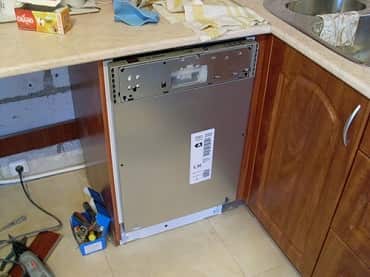 Most specialists cope with the installation of a dishwasher in a little over half an hour, taking a certain amount of money for their work. Every self-respecting owner will think: is it worth giving your money for work that you can do yourself? Perhaps not every man understands how to connect a dishwasher with his own hands. However, there is nothing supernatural in this process. Anyone who can hold the instrument in their hands is able to independently make the connection at home.
Most specialists cope with the installation of a dishwasher in a little over half an hour, taking a certain amount of money for their work. Every self-respecting owner will think: is it worth giving your money for work that you can do yourself? Perhaps not every man understands how to connect a dishwasher with his own hands. However, there is nothing supernatural in this process. Anyone who can hold the instrument in their hands is able to independently make the connection at home.
The simplest option for connecting such household appliances is non-stationary dishwashers. In this case, it will be enough to simply connect the drainage system to the general drain, and the water supply hose to the mixer, and you can start the device. Once the dirty dishes have been washed, the machine can be repacked and put aside until needed. This option is very convenient for small kitchens.
The installation of large dishwashers may require more detailed attention and skill, since their connection implies a stationary position of this type of household appliance. Self-intervention in this process may not always be successful and take a lot of time. Therefore, at the very least, it is advisable to consult with an experienced craftsman with specific knowledge and skill in such activities.
As a rule, the drain and supply hoses of the built-in dishwasher are hidden in decorative channels under the kitchen set, and connected to the drain pipe in the kitchen. The machine itself fits into the design of the kitchen furniture.
If the owner of the house wants to connect the equipment on his own, the following recommendations may be needed for this.
Necessary tools
Installing a dishwasher is impossible without a specific set of tools and necessary parts. In addition to the fact that a non-professional installer must stock up on a lot of time and read the instructions for this technique, it is necessary to prepare in advance the entire set of inventory for self-connecting the machine. This may require:
- ball valve;
- siphon;
- several clamps;
- provide for the possibility of power supply;
- puncher and screwdriver;
- pliers;
- set of wrenches;
- several flat and Phillips screwdrivers;
- strictly horizontal installation requires the use of a level.
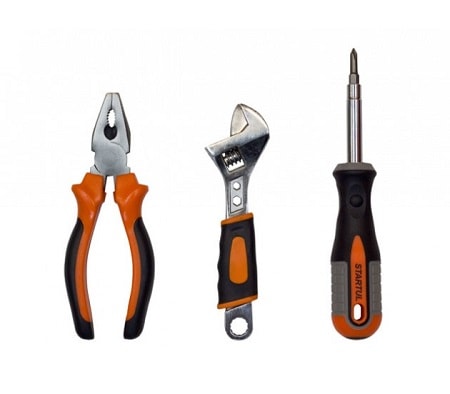
The deviation from the horizon should not exceed two degrees. When buying a dishwasher, you should immediately pay attention to whether connection hoses are available. For the connection of the built-in dishwasher, a solid base must be provided in order to prevent it from vibrating during operation. Otherwise, there is a high probability that the equipment will quickly fail.
Any household appliance, including a dishwasher of any model, has instructions for its installation and operation. It is not recommended to neglect this booklet.It is these step-by-step actions that should be followed when the equipment is installed. Most often, such connection schemes are intuitively simple and will help to make a high-quality connection of a household appliance.
![]() See also - Diy built-in dishwasher installation
See also - Diy built-in dishwasher installation
Conditions for a kitchen set
It is necessary to plan the installation of built-in kitchen appliances when creating a general kitchen interior. Otherwise, in the future, solutions may arise that require large and expensive reconstructions. However, practice shows the opposite: most people buy stationary dishwashers when the set has long occupied kitchen meters and the installation of a dishwasher turns into a real revolution.
When the connection of a large dishwasher is carried out at the later stages of planning a kitchen interior, it should be understood that the standard size of the dishwasher width is 600 mm. For this, a hollow cabinet must be provided in the kitchen set in accordance with the parameters of the installed equipment. All necessary openings for drainage, water supply and electrical communications should be prepared in advance.
Connecting the water supply channel
The water supply must be from the same path as the kitchen mixer. To do this, you need the hose that comes with the machine. The standard size of such a hose is at least half a meter. If the need arises, it can be lengthened. But it is better to avoid such manipulations, since a leak may occur at the joints over time. Understanding the quality of the water in the water pipe, it is imperative to put filter barriers for deep water purification before supplying water to the dishwasher. Financial investments for the purchase of a water filtration system are very quickly repulsed, because the technical restoration of a dishwasher is much more expensive.
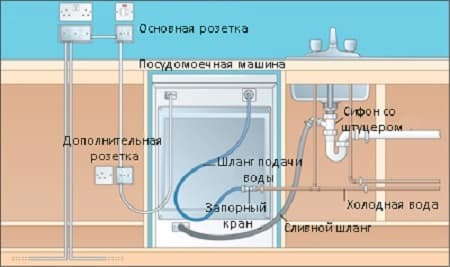
It is also necessary to provide for an emergency shutdown of the water supply. This requires the installation of a ball valve. In some models of built-in dishwashers, the manufacturer already provides a shut-off tap. In this case, additional valve installation is not required.
Very often the dishwasher only needs cold water. In some situations, the use of hot water is also allowed, as this helps to reduce the operating time of the heating elements, which will significantly reduce energy consumption.
![]() See also - Choosing a compact tabletop dishwasher
See also - Choosing a compact tabletop dishwasher
Drainage system (sewerage)
Waste, dirty water after washing dishes is discharged through the drainage channel. The drain communication is connected to the "tee" in the siphon located under the sink. The installation of the drain channel should provide for a slight slope so that the water can leave on its own, thereby excluding the possibility of a backflow of waste liquid into the dishwasher.
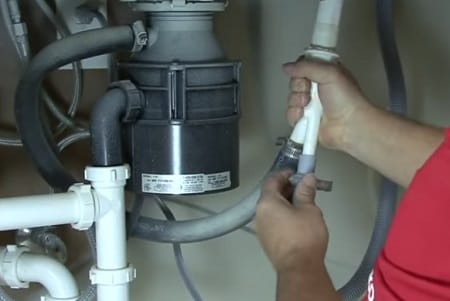
It is also worth paying attention to the fact that the length of the drain channel should not be too long. Otherwise, the dishwasher pump will experience unnecessary overload, which is undesirable for its operation. The length of the drainage channel should not exceed two meters. For this, the installation of the device should be as close as possible to the drain point.
Power supply
Connecting the dishwasher to the power supply is easy. However, you must be extremely careful: to supply the pump and the dishwasher motor with electric current, you need a high-quality cable, the insulation of which will correspond to the expected load, without visual damage. It is strongly discouraged to connect to sockets with other kitchen appliances.Such an error can provoke overheating and melting of the plug, socket, power cables, dishwasher body, and other combined elements.
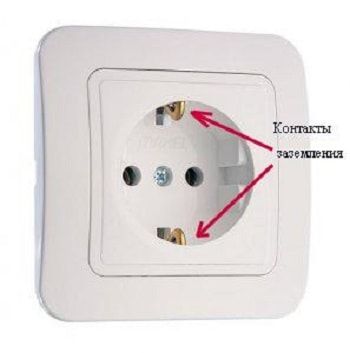
For the dishwasher, it is necessary to install a separate outlet, thanks to which this technique will work. It is also not advisable to use extension cords. The socket for the device must be grounded, this will exclude the possibility of electric shock at the moment of touching the body of the machine.

